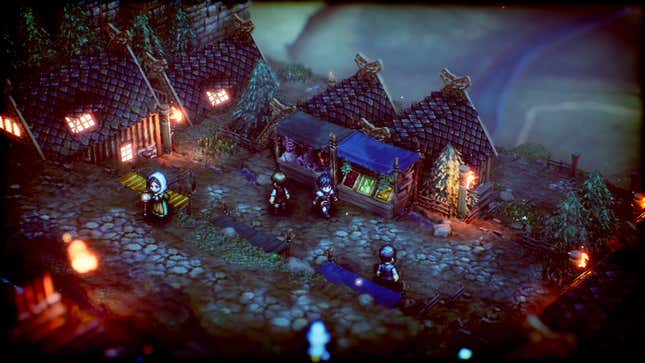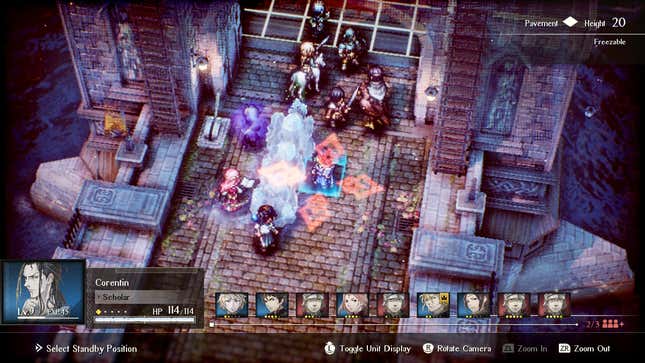
Think back to the last argument you had. Did you sway the other person to your side? How much effort did that take? That tug-of-war—the fraught nature of persuasion, and the notion that you don’t initially know if you’ve pulled it off—is the unexpected crux of Project Triangle Strategy, an upcoming tactical game from Square Enix with a demo already on the Nintendo eShop.
Announced during yesterday’s Nintendo Direct, Project Triangle Strategy (don’t worry, that’s a working title) is a tactical role-playing game “full of choices and consequences.” Immediately after the event, Square Enix made the demo available on Switch, and it offers more than a mere peek at the game. To give you an idea of how meaty the demo was, it took me just under five hours to hit the requisite “Thank you for playing our demo” screen. In that time, I fought two battles. The rest? All chit-chat.
Fans of tactical role-playing games will be happy to hear that Project Triangle Strategy’s battles are everything you’d want and more. Yes, your units are all assigned specific jobs—standard fare like soldier, spear knight, physician, scout, and so on—and you move them around a grid-based battlefield on a turn-by-turn basis. Some can travel further than others. Some have ranged attacks. If you’re about to move a unit in range of an enemy unit, you’ll see a red line connecting the two. You know the drill. If you’ve played Fire Emblem or Square’s own pivotal Final Fantasy Tactics, you’ve played this before.
Still, there are some neat gimmicks. Backstabbing, for one, plays a major role in each fight. Each unit ends their turn by choosing to face in one of the four cardinal directions. Any attacks suffered from behind result in an instant critical hit. What’s more, if you’re able to sandwich an enemy by placing a unit on either side, both of your units will attack at the same time. (Fair warning: The same thing can happen to your units.) As a result, tense moments become a game of tactical leapfrog.
You can also manipulate the battlefield to your advantage in some pretty cool ways. For instance:

I will not apologize for that pun.
Purely on mechanics, Project Triangle Strategy is a competent tactical game. That alone will scratch the itch of anyone looking for a genre throwback with some modern tweaks. If that’s all you want to know, get thee to the eShop. But you should know that the most interesting stuff happens in between each fight.
Yesterday’s demo showcases two chapters from Project Triangle Strategy. Square Enix offers a warning upfront that, because you’re dropped in the thick of it, you might not fully grasp what’s going on. Though I didn’t recognize all the proper nouns, the plot wasn’t too difficult to follow. The villains are comically evil, the heroes impractically virtuous, and both sides are wrapped up in a paint-by-numbers narrative of court intrigue, betrayal, and Medieval-era geopolitics, at least in these two available chapters.
(If anything, I was thrown for a loop more by the game’s unconventional spelling. In the fiction of Project Triangle Strategy, “domains” is spelled “demesnes,” while “jail”—the place someone needs to go for this naming structure—is spelled “gaol.”)
You play as a young crown prince named Serenoa. At the start of the second available chapter, you and your crew are holed up in a castle, bracing for an assault from nearby Aesfrost. They’d like to leave with Roland, a member of your crew, and promise no violence if you just hand him over, thank you very much. So you’re faced with a choice: Hand over Roland, or don’t.
As all monarchies should operate, the end result is made via democratic process. Most members of your team—including Roland himself—think you should hand him over for the sake of peace. Some members think you should stand and fight. One is undecided. You, as Serenoa, are granted one vote but cannot unilaterally make the decision. Instead, prior to the call, you have the chance to sway party members one way or the other.
You can try to convince people to change their minds through dialogue options, but you don’t initially have many at your disposal. By heading into the castle’s town, you can talk to your citizens and glean added information, unlocking more dialogue options. For instance, I learned locational secrets that could sway the tide for the better, which seemed to convince people that a battle wouldn’t be for naught. But that’s the catch: Even if you sway someone, you won’t know for sure if your efforts at persuasion worked. Rather, that character will move to the “undecided” column. You’ll find out when the votes are cast.
I made an extra effort to dig up as much info as I could to convince my team that we should not hand Roland over. Once the votes were tallied, eight of my nine teammates—including Roland himself, boo-yah—decided to stand and fight. One did not.
So we stood our ground. We fought. I made the additional decision to set up various flaming traps around the battlefield, knowing full well that activating them would immolate vast swathes of the town. I practically burnt my castle to a crisp in order to prevent Roland from falling into enemy hands, a decision the game made me feel guilty about by mentioning, over and over again, how I had upended the lives of my citizens, how depraved I was for doing so, how out of my mind I was for valuing the life of one over the lives of many. Even the game’s villain sneeringly expressed shock at my decision. But that’s the role of a leader: You roll the dice. You make a choice. You’ve weighed the odds and realize that the outcome you want is worth the risk, no matter the blowback it might inflict on others.
In the battle, Roland was the first to die.